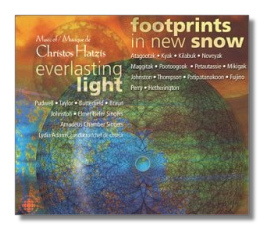
The Internet's Premier Classical Music Source
Related Links
- Hatzis Reviews
- Latest Reviews
- More Reviews
-
By Composer
-
Collections
DVD & Blu-ray
Books
Concert Reviews
Articles/Interviews
Software
Audio
Search Amazon
Recommended Links
Site News
 CD Review
CD Review
Christos Hatzis

Chamber Works
- De Angelis
- Everlasting Light
- Fertility Rites
- Hunter's Dream
- Footprints in New Snow
- String Quartet #1 "The Awakening"
Annalee Patipatanakoon, Carol Fujino, violins
Douglas Perry, viola
David Hetherington, cello
Elmer Iseler Singers
Amadeus Chamber Singers/Lydia Adams
Beverley Johnston, percussion
Inuit throat singers
CBC Records MVCD1156-2 DDD 2CDs: 67:57, 74:20
Of Greek parentage, Canadian composer Christos Hatzis dispels quaint notions that there's nothing going on with our neighbors to the north other than hockey and Anne Murray. The first CD contains choral music of the most refined and ethereal sort. The second contains several works, including a radio documentary, inspired by the native Inuit people and their peculiar art of throat singing.
De Angelis is based on an antiphon by Hildegard von Bingen, a composer Hatzis admires greatly not just for her music but also for her theology. Hatzis's work quotes from and expands upon her "O gloriosissimi lux vivens angeli," and it also mirrors her belief in a central role played by womankind in Christian theology, and her vision of the eventual reconciliation of the fallen angel Lucifer with Christ. Hatzis uses musical and spatial symbolism to illustrate these concepts, and more. The casual listener will not appreciate Hatzis's cleverness, but he or she will appreciate his sincerity and devotion; De Angelis is a strikingly attractive addition to the contemporary choral repertoire.
After Canadian choral director Elmer Iseler passed away, Hatzis wrote Everlasting Light for Iseler's eponymous ensemble. According to the composer, it is "more a ritual than a piece of concert music," and it concerns itself not just with death but with the idea of an afterlife. Here, the choir is joined by tuned water glasses and marimba; three soloists (countertenor, tenor, and baritone) play a prominent role. Everlasting Light, while never sweet or maudlin, is almost unbearably beautiful, suggesting that death brings out the best in many of us. Given the composer's background, it is not difficult to discern an affinity between Everlasting Light and music for the Greek Orthodox service, albeit with a gently experimental twist.
Few would guess that the man who composed these two rarefied choral works also composed the works on the second CD. Hatzis has been interested in the Inuit people for more than a decade, and was especially intrigued by their throat singing, with they call "katajjaq." Probably derived from old fertility rites, katajjaq is practiced primarily by Inuit women, although men can do it too. Guttural, rhythmic, repetitious, and exhausting for the practitioners, it is a game of sorts in which natural phenomena of the Inuit world are turned into sonic building blocks. It's a primal "rap," if you will.
Hatzis's experience as an electroacoustic composer is manifested here. Having recording the katajjaq, he alters them electronically and combines them with other sounds, making a strange and fascinating experience even stranger and more fascinating. In Fertility Rites, sampled throat songs play counterpoint games with a marimba; in Hunter's Dream, they are combined with flute samples. Footprints in New Snow is a 38-minute radio documentary incorporating Inuit throat songs with interviews and other sounds associated with Inuit life and culture – the blowing wind, the cry of wolves, the sound of snow crunching underfoot, and so on. Not a dry academic lecture at all, Footprints in New Snow is as haunting and atmospheric as it is informative. (It won the 1996 Prix Italia Special Prize in the category of Radio Music.) The First String Quartet was another prize winner. In this work, perhaps taking a page from Steve Reich, Hatzis incorporates not just samples of throat singing but the sound of a locomotive, which brings back powerful memories of the composer's childhood. Together, all these sounds create what the composer calls a metaphor for "primal breathing, Yin and Yang, the endless cycle of creation and destruction which determines the fate of individuals, nations, and humanity as a whole."
Despite the unusual aspects of his work, Hatzis seems uninterested in easy effects or sensationalism. His music makes performers and listeners alike work hard; the open-eared will certainly want to meet him at least halfway, once they get a whiff of the sounds on these CDs.
Performances and production values are at a very high level on this release. This is music that is worthy of exposure and study outside of the country in which it was composed.
Copyright © 2003, Raymond Tuttle


















